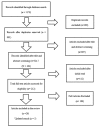A Scoping Review of the Health of Conflict-Induced Internally Displaced Women in Africa
- PMID: 32079235
- PMCID: PMC7068277
- DOI: 10.3390/ijerph17041280
A Scoping Review of the Health of Conflict-Induced Internally Displaced Women in Africa
Abstract
Armed conflict and internal displacement of persons create new health challenges for women in Africa. To outline the research literature on this population, we conducted a review of studies exploring the health of internally displaced persons (IDP) women in Africa. In collaboration with a health research librarian and a review team, a search strategy was designed that identified 31 primary research studies with relevant evidence. Studies on the health of displaced women have been conducted in South- Central Africa, including Democratic Republic of Congo (DRC); and in Eastern, East central Africa, and Western Africa, including Eritrea, Uganda, and Sudan, Côte d'Ivoire, and Nigeria. We identified violence, mental health, sexual and reproductive health, and malaria and as key health areas to explore, and observed that socioeconomic power shifts play a crucial role in predisposing women to challenges in all four categories. Access to reproductive health services was influenced by knowledge, geographical proximity to health services, spousal consent, and affordability of care. As well, numerous factors affect the mental health of internally displaced women in Africa: excessive care-giving responsibilities, lack of financial and family support to help them cope, sustained experiences of violence, psychological distress, family dysfunction, and men's chronic alcoholism. National and regional governments must recommit to institutional restructuring and improved funding allocation to culturally appropriate health interventions for displaced women.
Keywords: Africa; health; internally displaced women; scoping review; women’s health.
Conflict of interest statement
The authors declare no conflict of interest. The funders had no role in the design of the study; in the collection, analyses, or interpretation of data; in the writing of the manuscript, or in the decision to publish the results.
References
-
- Internal Displacement Monitoring Center Global Report on Internal Displacement. [(accessed on 10 July 2019)]; Available online: http://www.internal-displacement.org/sites/default/files/publications/do....
-
- WHO Inter-Agency Field Manual on Reproductive Health in Humanitarian Settings. [(accessed on 5 August 2010)]; Available online: https://www.who.int/reproductivehealth/publications/emergencies/field_ma...
-
- Brookings Institution Improving the Protection of Internally Displaced Women: Assessing Progress and Challenges. [(accessed on 11 March 2014)]; Available online: https://www.brookings.edu/
-
- Mulugeta A.A. The African Union Convention on internally displaced persons: Its codification background, scope, and enforcement challenges. Refug. Surv. Q. 2010;29:28–57. doi: 10.1093/rsq/hdq029. - DOI
-
- WHO Draft Global Action Plan ‘Promoting the health of refugees and migrants’ (2019–2023) [(accessed on 25 January 2020)]; Available online: https://www.who.int/migrants/en/
Publication types
MeSH terms
LinkOut - more resources
Full Text Sources
Medical
Research Materials


